|
| |
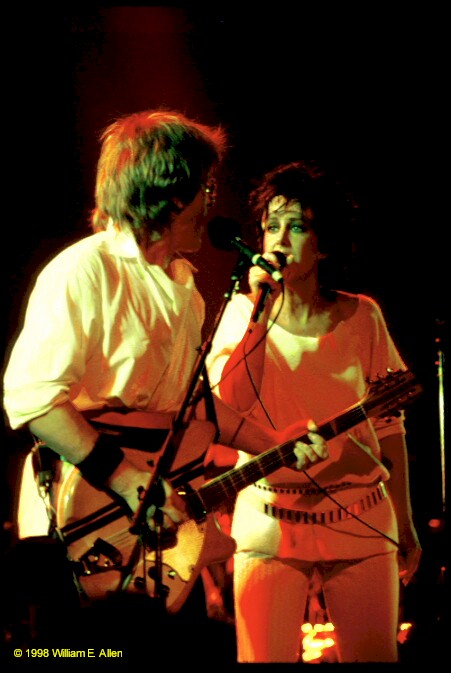
Paul Kanter & Grace Slick
Jefferson Starship was among the most successful arena rock bands of the 1970s and
early '80s, an even greater commercial entity than its predecessor, Jefferson Airplane,
the band out of which it evolved. Many Jefferson Airplane fans decried the group's new,
more mainstream musical direction, especially after Airplane singers Grace Slick and Marty
Balin departed in 1978. But with shifting personnel, Jefferson Starship managed to please
its new fans and some old ones over a period of a decade before it shifted gears into even
more overtly pop territory and changed names again to become simply Starship.
Jefferson Airplane, the seminal San Francisco psychedelic rock band of the 1960s,
noted for its hits "Somebody to Love" and "White Rabbit," began to
fragment in the early '70s. Lead guitarist Jorma Kaukonen and bassist Jack Casady
increasingly were preoccupied with their spin-off group Hot Tuna, while the band's other
creative axis, rhythm guitarist/singer Paul Kantner (born Paul Lorin Kantner in San
Francisco, CA, March 17, 1941) and singer Grace Slick (born Grace Barnett Wing in or near
Chicago, IL, October 30, 1939), having become a romantic couple, had their own musical and
political interests, and singer Marty Balin (born Martyn Jerel Buchwald in Cincinnati, OH,
January 30, 1942), the odd man out, had become sufficiently disenchanted with the band he
himself had formed that he quit Jefferson Airplane at the end of a tour over the
Thanksgiving weekend in 1970. The following week saw the release of Blows Against the
Empire, Kantner's debut solo album, which he had recorded with a long list of musician
friends from Jefferson Airplane, the Grateful Dead, and Crosby, Stills & Nash, among
others. To pay tribute to this loose-knit studio ensemble and refer to the album's science
fiction theme, Kantner co-billed the album to "Jefferson Starship," even though
there was, as yet, no such permanent entity. Nevertheless, the album featured performers
who would be members of Jefferson Starship when it was established as a real band, in
particular Kantner, Slick, and Quicksilver Messenger Service member David Freiberg (born
in Boston, MA, August 24, 1938).
A year later, in late 1971, Kantner and Slick released a duo album, Sunfighter. One
track, "Earth Mother," was a song written by Jack Traylor, a high-school English
teacher and friend of Kantner's, and on lead guitar was teenager Craig Chaquico (born
September 26, 1954), a student of Traylor's and a member of his band, Steelwind. Jefferson
Airplane gave what turned out to be its final performance in September 1972, by which time
Freiberg had joined the group. The next album out of the Jefferson Airplane troupe was
Baron von Tollbooth & the Chrome Nun, credited to Kantner, Slick, and Freiberg, and
released in the spring of 1973, an album that featured the other members of Jefferson
Airplane in subsidiary roles, and on which Chaquico also appeared. Many of the same
musicians appeared on Grace Slick's debut solo album, Manhole, released in early 1974.
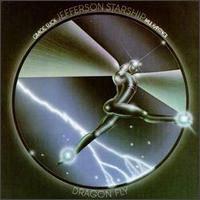
Dragon Fly - 1974
Credited to "Grace Slick/Paul Kantner/Jefferson Starship," Dragon Fly was the
transitional album between the various shifting aggregations Slick and Kantner had been
recording with as Jefferson Airplane dissolved in the early 1970s and the new Jefferson
Starship (which essentially was the Airplane with a new guitarist and bassist - Craig
Chaquico and Pete Sears). But where such preceding efforts as Sunfighter, Manhole, and
Baron Von Tollbooth and the Chrome Nun had suffered from indulgence and a lack of focus,
Dragon Fly, from the first note of its rocking leadoff track, "Ride the Tiger"
(a chart single), was a unified effort. Like much of the Airplane catalog and all of the
Starship albums to follow, the album suffered from the band's communal approach to song
selection (the eight tracks credited 12 writers, half of them band members), leading to an
unevenness in the material. But unlike the recent Kantner/Slick/etc. albums, it sounded
like the work of a seasoned band. (It didn't hurt that the album was cut just after a
tour, instead of before one.) Especially notable was Chaquico, who on such tracks as
"All Fly Away" and "Hyperdrive" demonstrated that he was a distinctive
lead guitarist able to define the Starship sound just as the very different Jorma Kaukonen
had the Airplane. But what turned Dragon Fly into an artistic and commercial triumph (it
was the most popular album any of these people had been involved with in five years) was
the return, for one song, of former Airplane singer Marty Balin, since that one song was
the epic power ballad "Caroline," which became a radio favorite and remains one
of the best songs the Airplane/Starship ever did. - William Ruhlmann
1 - (5:13) Ride The Tiger
2 - (5:05) That's For Sure
3 - (3:52) Be Young You
4 - (7:34) Caroline
5 - (4:06) Devil's Den
6 - (3:50) Come To Life
7 - (5:30) All Fly Away
8 - (7:44) Hyperdrive

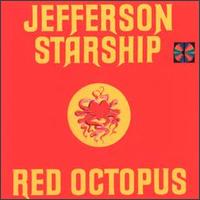
Red Octopus - 1975
Technically speaking, Red Octopus was the first album credited to Jefferson Starship,
though practically the same lineup made Dragon Fly, credited to Grace Slick/Paul
Kantner/Jefferson Starship. The difference, however, was crucial: Marty Balin was once
again a fully integrated band member, writing or co-writing five of the ten tracks. And
there can be little doubt that it was Balin's irresistible ballad "Miracles,"
the biggest hit single in the Jefferson Whatever catalog, that propelled Red Octopus to
the top of the charts, the only Jefferson album to chart that high and the best-selling
album in their collective lives. This must have been sweet vindication for Balin, who
founded Jefferson Airplane but then drifted away from the group as it veered away from his
musical vision. Now, the collective was incorporating his taste without quite integrating
it - "Miracles," with its strings and sax solo by nonband member Irv Cox, was
hardly a characteristic Airplane/Starship track. But then, neither exactly was Papa John
Creach's showcase, "Git Fiddler," or bassist Pete Sears' instrumental
"Sandalphon," which sounded like something from an early Procol Harum album.
Slick has three strong songs, among them the second single "Play on Love." Like
Dragon Fly, Red Octopus reflected a multiplicity of musical tastes; there were ten
credited songwriters, seven of whom were in the band. If there is any consistency in this
material, it is in subject matter (love songs). The album is more ballad-heavy and melodic
than the Airplane albums, which made it more accessible to the broader audience it
reached, though "Sweeter Than Honey" is as tough a rocker as the band ever
played. - William Ruhlmann
01 - (3:31) Fast Buck Freddie
02 - (6:55) Miracles
03 - (3:12) Git Fiddler
04 - (4:19) Ai Garimasu (There Is Love)
05 - (3:25) Sweeter Than Honey
06 - (3:47) Play On Love
07 - (3:30) Tumblin'
08 - (4:38) I Want To See Another World
09 - (4:13) Sandalphon
10 - (5:06) There Will Be Love

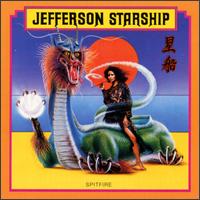
Spitfire - 1976
Trying to follow up the overwhelming success of their last record proved too much for
the Starship. Nothing here can compare with the hit sound they had forged previously
although they did get chart action with the song "With Your Love." Otherwise, a
bad bump in the road for Jefferson Starship. - James Chrispell
1 - (5:33) Cruisin'
2 - (5:05) Dance With The Dragon
3 - (3:20) Hot Water
4 - (6:45) St. Charles
5 - (7:21) Song To The Sun - Ozymandias - Don't Let It Rain
6 - (3:37) With Your Love
7 - (4:03) Switchblade
8 - (3:24) Big City
9 - (3:34) Love Lovely Love

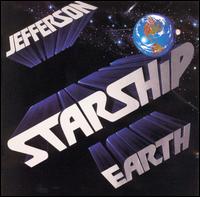
Earth - 1978
Jefferson Starship had figured out how to craft high-octane, high-gloss AOR rock with
Red Octopus, a highlight of mainstream hard rock in the '70s. Instead of being a launching
pad to greater things, the album turned out to be the group's pinnacle, and in the years
following its release, the group simply recycled its ideas. In the case of its sequel,
Spitfire, that was acceptable, because they had enough hooks to make the similarity
forgivable. On Earth, however, they had neither the melodies, hooks or style to make a
second rewrite of Red Octopus tolerable. Earth has the form, but not the content, of
Jefferson Starship's masterpiece - it just sits there, lacking either hard rockers or
sappy ballads. Arguably, it's the group's low point of the '70s. - Stephen Thomas Erlewine
1 - (6:10) Love Too Good
2 - (3:19) Count On Me
3 - (4:16) Take Your Time
4 - (3:43) Crazy Feelin'
5 - (3:24) Skateboard
6 - (4:49) Fire
7 - (4:41) Show Yourself
8 - (5:27) Runaway
9 - (6:37) All Nite Long

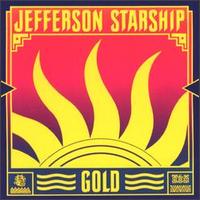
Gold - 1979
This 1979 compilation culls the hit singles and strongest album tracks from Jefferson
Starship's four elemental-titled albums of the 1970s: 1974's Dragon Fly (evoking air), the
1975 number one smash Red Octopus (water), 1976's Spitfire (fire), and the more obviously
titled Earth from 1978. These albums saw the Jefferson Starship hit-making machine at its
peak, so this collection is a fine entrance for those new to the band's '70s material.
It's a remarkably democratic set; tracks are selected evenly from Dragon Fly (three), Red
Octopus (three), Spitfire (two), and Earth (three), and are divided fairly equitably among
lead vocalists: Marty Balin (six), Grace Slick (four), and Paul Kantner/group (two). In
the course of listening, it becomes obvious how strongly Balin's increasing MOR
sensibilities were guiding the group's path as the decade progressed: By the end, he was
singing all the radio hits. The Top 40 hits - "Miracles," "With Your
Love," "Count on Me," and "Runaway" - are, of course, all
included, as are a few of the group's more ambitious efforts: the sweeping soundscape
"St. Charles," the heartfelt poetry of "Caroline," and the remarkable
Grace Slick meditation on aging, "Hyperdrive." Unfortunately, owing to needless
space considerations, some of the cuts are edited for length: "Miracles" is
snipped from its seven-minute original to the 3:30 radio edit, and a minute is hacked from
both "Runaway" and "Hyperdrive." The one unreleased track included,
1978's "Light the Sky on Fire," is an entirely forgettable Marty Balin vehicle
with misplaced horns and a Pete Townsend-esque keyboard riff. Gold, as a compilation,
doesn't adequately showcase the instrumental talents of lead guitarist Craig Chaquico,
drummer John Barbata, fiddler Papa John Creach, or bassists/keyboardists Pete Sears and
David Freiberg; nevertheless, it sits nicely as an overview of the group's multifaceted
work in the second half of the decade. - Joseph McCombs
01 - (5:13) Ride The Tiger
02 - (7:33) Caroline
03 - (3:46) Play On Love
04 - (6:56) Miracles
05 - (3:32) Fast Buck Freddie
06 - (5:12) Light The Sky On Fire
07 - (3:38) With Your Love
08 - (6:44) St. Charles
09 - (3:19) Count On Me
10 - (6:08) Love Too Good
11 - (5:26) Runaway
12 - (7:44) Hyperdrive

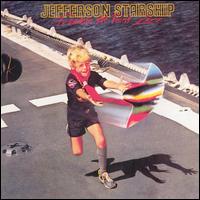
Freedom At Point Zero - 1979
Freedom at Point Zero is not a great Jefferson Starship album; the wonder is that it is
as good as it is. Since the band's previous album, the Top Ten, million-selling Earth, the
group had lost its two lead singers, Grace Slick and Marty Balin, and they had been
replaced by Mickey Thomas. "Jane," released as a single in advance of the album,
displayed the result - even before Thomas' soaring tenor entered, it sounded like
Foreigner. But it also made the Top 20, which helped the album into the Top Ten and to a
gold record award. Reluctant leader Paul Kantner came back to the fore, and, at least on
the energetic "Girl With the Hungry Eyes" (a chart single), that was a good
thing, though the more typically discursive, rhythmically static songs like
"Lightning Rose" and "Things to Come" (on which Thomas, through the
magic of overdubbing, replaced Slick and Balin) slowed things down. Other songwriting
contributors such as bassist Pete Sears and guitarist Craig Chaquico brought in generic
arena rock bombast like "Awakening" and "Rock Music," making this a
typically uneven effort. Although Freedom at Point Zero demonstrated that the group could
soldier on, the band without its quirky individualists was ultimately too generic, which
made Slick's return on the next album welcome. - William Ruhlmann
1 - (4:18) Jane
2 - (4:43) Lightning Rose
3 - (4:52) Things To Come
4 - (8:05) Awakening
5 - (3:36) Girl With The Hungry Eyes
6 - (5:27) Just The Same
7 - (3:41) Rock Music
8 - (3:44) Fading Lady Light
9 - (4:33) Freedom At Point Zero

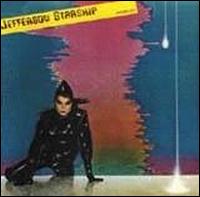
Modern Times - 1981
This second edition of the Mickey Thomas-era Jefferson Starship/Starship polished '80s
rock is actually a weird hybrid which you could call psychedelic metal. For fans of the
fragments that were Sunfighter, Baron von Tollbooth & The Chrome Nun, Manhole, and
other experimental Airplane offshoots, this material is much too mainstream for its own
good. But it isn't the eminently dislikable Mickey Thomas who is the major culprit as much
as it is producer/engineer Ron Nevison, whose homogenization of records from Ozzy Osborne
to Heart displayed a glaring lack of creativity, inspiration, or sense of anything
remotely resembling art. Yes, Marty Balin actually practiced "Jane" with the
group prior to his leaving the Freedom at Point Zero sessions, and had he stayed onboard,
the approach may have been a more progressive folk-rock. It was Larry Cox who engineered
from Dragon Fly to Spitfire, co-producing the music with the very capable band. Minus
Balin and Cox, the true evolution of the Airplane sound is mutated and muffled on Modern
Times. Critic William Ruhlmann noted that "Stairway to Cleveland" is "as
gutsy a statement of purpose as any in rock," but that tune and the title track, two
ofPaul Kantner's three contributions, are the only ones with elements that stay true to
the band's original mission. "Stairway to Cleveland" follows the dramatic and
techno-orchestrated "Alien," which at least is better than the generic
"Free" preceding it, or the second cousin to "Jane," which is
"Mary." It means you have to sift through the Mickey Thomas/Ron Nevison
sterilization to find the advertised product: Jefferson Starship music. "Mary"
is a far cry from what the Jefferson Starship name implies and belonged on a Mickey Thomas
solo disc. Rather than continue the natural evolution of the Airplane sound, both
"Jane" and its follow-up, "Find Your Way Back," lead off their
respective albums and borrow heavily from Foreigner's 1978 hit, "Hot Blooded"
(itself a nick of David Bowie's "Jean Genie"). "Find Your Way Back"
went Top 30 in the Spring of 1981, and is a decent arena-rocker from the pen of Craig
Chaquico that the guitarist sometimes opens his jazz shows with. Considering where
Chaquico went after Starship's breakup, a jazzier direction for the group may have been
more worthwhile than arena rock and could have had more staying power. The liners
proclaim, "And introducing Grace Slick," and that's humor the album needed more
of. Slick's presence enhances the LP, Pete Sears and wife Jeannette Sears creating in
"Stranger" a precursor to "We Built This City" where Slick and Mickey
Thomas blend their voices, but that's the future. Paul Kantner's "Wild Eyes"
would work better in the previous settings of "Red Octopus" and
"Earth," for here it has that psychedelic metal sound again which is just too
overdone to matter to longtime fans of the group. This disc has become a bit of a
collectible on eBay, GEMM, and other Internet sales sites with both the LP and the 1990 CD
out of print at the beginning of the new millennium. Modern Times was used as an album
title by a variety of artists from jazz to folk to country. Al Stewart, Johnny Paycheck,
Tracy Schwarz, Mike Seeger, and others packaged their sounds under the same moniker, and
despite its moments, this Modern Times, its predecessor Freedom at Point Zero, and its
successors, Winds of Change and Nuclear Furniture, became the antithesis of the works of
art which are Dragon Fly, Red Octopus, Earth, and Spitfire. Ron Nevison produced three of
the four 1980s hard rock albums by this group: Draw your own conclusions. - Joe Viglione
1 - (4:15) Find Your Way Back
2 - (4:43) Stranger
3 - (4:04) Wild Eyes (Angel)
4 - (6:01) Save Your Love
5 - (2:38) Modern Times
6 - (3:38) Mary
7 - (4:37) Free
8 - (4:43) Alien
9 - (3:59) Stairway To Cleveland (We Do What We Want)

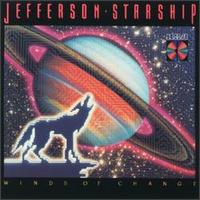
Winds Of Change - 1982
Winds of Change is, along with its predecessor Modern Times, one of the weakest entries
in the Jefferson Starship catalog. The utter absence of Paul Kantner (save for the obtuse
and confused politics of "I Came Back From the Jaws of the Dragon") means that
this album, more than any previous effort, relies on the input of outside songwriters.
Primary among these writers is Jeannette Sears, wife of band guitarist/keyboardist Pete
Sears, whose four efforts are pleasantly structured but lyrically trite and blandly
executed by the group. Grace Slick, who officially returned to the band for this album
after guesting on Modern Times, offers an engaging performance on the sultry "Black
Widow," only to counteract it with the utter train wreck "Out of Control."
Meanwhile, Mickey Thomas is his predictable, consistent self, generally heartless in his
lead vocals but filling in the high lead nicely on the moderate hit singles "Be My
Lady" and the title track. In the hands of another band, Winds of Change might be
passable '80s fare, but in light of the vast Jefferson family discography, the album is
strikingly unadventurous and hardly worthy of the band's legacy. - Joseph McCombs
1 - (3:54) Winds Of Change
2 - (5:04) Keep On Dreamin'
3 - (3:54) Be My Lady
4 - (4:00) I Will Stay
5 - (2:56) Out Of Control
6 - (4:51) Can't Find Love
7 - (5:03) Black Widow
8 - (6:01) I Came Back From The Jaws Of The Dragon
9 - (5:04) Quit Wasting Time

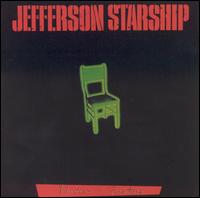
Nuclear Furniture - 1984
Nuclear Furniture, like the other Jefferson Starship albums of the early '80s, is a
competent but rather forgettable collection of radio-friendly dual guitar/keyboard period
pop tunes. It holds up better than previous efforts Modern Times and Winds of Change,
though, due to improved songwriting and the temporarily revitalized presence of Paul
Kantner (who would acrimoniously leave the band, taking the "Jefferson" with
him, after this album). Kantner's three efforts - "Connection," "Rose Goes
to Yale," and "Champion" - paint an intriguing and sometimes humorous
picture of sifting through a post-apocalyptic Earth. "Champion," in fact,
perfectly synthesizes his dual roles as unapologetic idealist hippie and aging
storyteller/mythmaker. The remaining tracks are largely mid-tempo rockers, sounding much
like Foreigner filler. "No Way Out" became a Top 40 hit with its catchy keyboard
riff, but on most of the other cuts, bandmembers Craig Chaquico, Pete Sears, David
Freiberg, and Donny Baldwin are content to go through the motions. The usually
thought-provoking Grace Slick commits the almost unpardonable sin of applying cheesy synth
drums to her composition "Magician," but acquits herself on the smart, intense
"Showdown," one of her finest moments of the '80s, both lyrically and vocally.
All told, Nuclear Furniture is most notable in the Jefferson lexicon as the album that
made permanent the schism between Paul Kantner's lingering political punditry and Mickey
Thomas's desire for disposable arena rock. The tension between the two angles makes for an
intriguing if uneven album. - Joseph McCombs
01 - (4:13) Layin' It On The Line
02 - (4:25) No Way Out
03 - (4:09) Sorry Me, Sorry You
04 - (3:53) Live And Let Live
05 - (4:26) Connection
06 - (2:59) Rose Goes To Yale
07 - (3:25) Magician
08 - (3:55) Assassin
09 - (3:40) Shining In The Moonlight
10 - (3:24) Showdown
11 - (4:40) Champion

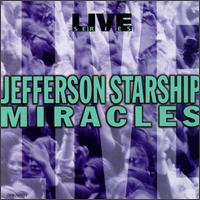
Miracles - 1997
CEMA Special Markets' Live: Miracles contains inferior latter-day live recordings of
both Jefferson Starship and Jefferson Airplane hits, from "Somebody to Love" to
"Miracles." Occasionally, the songs don't sound half bad, but most of the time
they do. Furthermore, the collection doesn't really capture a full concert - if it did, it
may have been of interest to collectors. As it stands, it's simply an unnecessary
collection for any sort of fan. - Stephen Thomas Erlewine
01 - (3:28) Somebody To Love [Live]
02 - (7:46) Miracles [Live]
03 - (3:31) Crown Of Creation [Live]
04 - (4:44) Shadowlands [Live]
05 - (3:31) White Rabbit [Live]
06 - (4:47) Count On Me [Live]
07 - (3:52) Intro To Lawman - Lawman [Live]
08 - (6:05) Wooden Ships [Live]
09 - (6:20) Women Who Fly [Live]
10 - (6:24) The Light (Ginger & Metaphysics) [Live]

|